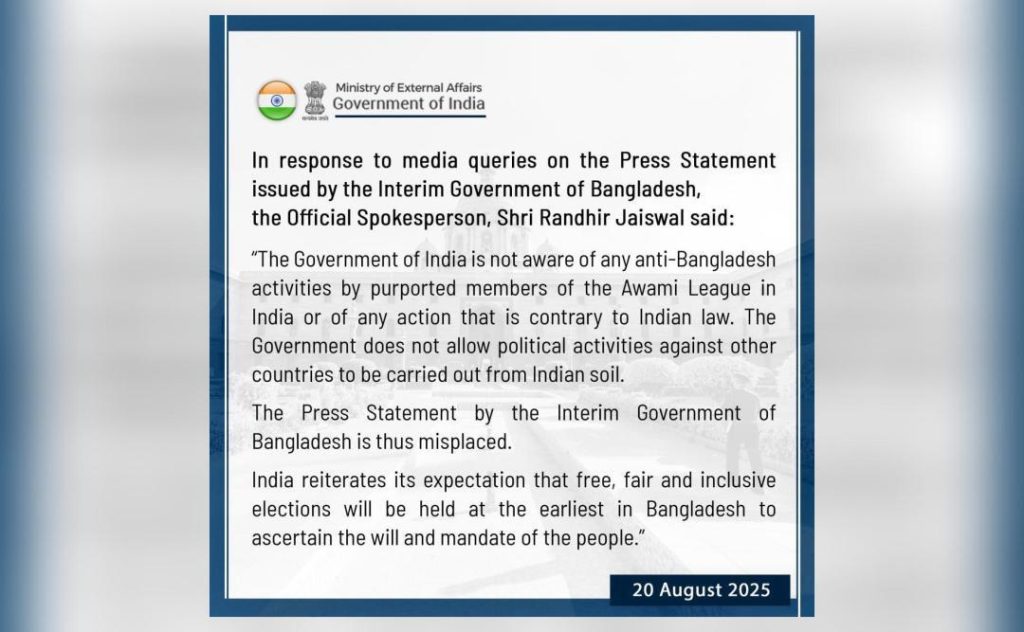
India Responds After Bangladesh Asks for Action on ‘Anti-Bangladesh Activities in India’
Recently, Bangladesh has asked India to take action against “anti-Bangladesh activities being undertaken by banned Bangladesh Awami League from Indian soil.” The demand has led to a strong response from the Indian government, which has categorically denied any involvement or knowledge of such activities.
In a statement, the Indian government said that it is “not aware of any anti-Bangladesh activities by purported members of the Awami League in India or of any action that is contrary to Indian law.” The statement further added that Bangladesh’s statement is “misplaced”, implying that the claim is unfounded and lacks any evidence.
The demand for action from the Bangladesh government came after reports emerged of alleged anti-Bangladesh activities being carried out by the banned Bangladesh Awami League party from Indian soil. The party, which is considered a terrorist organization by the Bangladesh government, has been accused of carrying out several attacks and acts of violence against minority communities in Bangladesh.
India and Bangladesh have historically enjoyed strong ties, with both countries sharing a common border and cooperating on a range of issues, including trade and security. However, in recent years, there have been tensions between the two countries, particularly over issues related to national security and terrorism.
The demand for action from the Bangladesh government comes at a time when both countries are engaged in a number of sensitive negotiations, including a landmark trade agreement and a deal to share the Ganga River. The Bangladesh Awami League party, which is led by expelled leader Salahuddin, has been accused of carrying out several attacks and acts of violence against minority communities in Bangladesh.
The Indian government’s response to the Bangladesh government’s demand for action is significant, as it signals a strong commitment to maintaining good relations with its neighboring country. By denying any involvement or knowledge of anti-Bangladesh activities, the Indian government has effectively sidestepped the issue and avoided any potential escalation.
The response also highlights the complex nature of the relationship between India and Bangladesh, with both countries facing a range of challenges and competing interests. While India and Bangladesh share a strong cultural and historical bond, they also have significant differences and competing interests, particularly when it comes to issues related to national security and terrorism.
In recent years, there have been several high-profile incidents of violence and terrorism in Bangladesh, including attacks on minority communities and secular bloggers. The Bangladeshi government has blamed these attacks on terrorist organizations, including the banned Bangladesh Awami League party, but many experts have raised questions about the government’s handling of the situation.
The Indian government’s response to the Bangladesh government’s demand for action is also significant in the context of India’s own internal security challenges. India has faced a range of security threats, including terrorism and insurgency, particularly in the country’s north-eastern and northwestern regions.
By denying any involvement or knowledge of anti-Bangladesh activities, the Indian government has effectively sidestepped the issue and avoided any potential escalation. However, the response also highlights the need for greater cooperation and communication between the two countries.
In recent years, there have been several initiatives aimed at improving relations and cooperation between India and Bangladesh. These initiatives have included the signing of several bilateral agreements and the establishment of a number of joint committees and working groups.
The Indian government’s response to the Bangladesh government’s demand for action is also significant in the context of India’s own internal security challenges. India has faced a range of security threats, including terrorism and insurgency, particularly in the country’s north-eastern and northwestern regions.
By denying any involvement or knowledge of anti-Bangladesh activities, the Indian government has effectively sidestepped the issue and avoided any potential escalation. However, the response also highlights the need for greater cooperation and communication between the two countries.
In recent years, there have been several initiatives aimed at improving relations and cooperation between India and Bangladesh. These initiatives have included the signing of several bilateral agreements and the establishment of a number of joint committees and working groups.
The Indian government’s response to the Bangladesh government’s demand for action is likely to be seen as a significant development in the ongoing relationship between the two countries. By denying any involvement or knowledge of anti-Bangladesh activities, the Indian government has effectively sidestepped the issue and avoided any potential escalation.
However, the response also highlights the need for greater cooperation and communication between the two countries. Both countries share a range of common interests and challenges, and it is essential that they work together to address these issues and promote greater understanding and cooperation.
Ultimately, the key to improving relations and cooperation between India and Bangladesh lies in greater communication and cooperation. By working together and addressing the range of common challenges and interests, both countries can promote greater understanding and cooperation, and create a more stable and secure region.
Sources:






